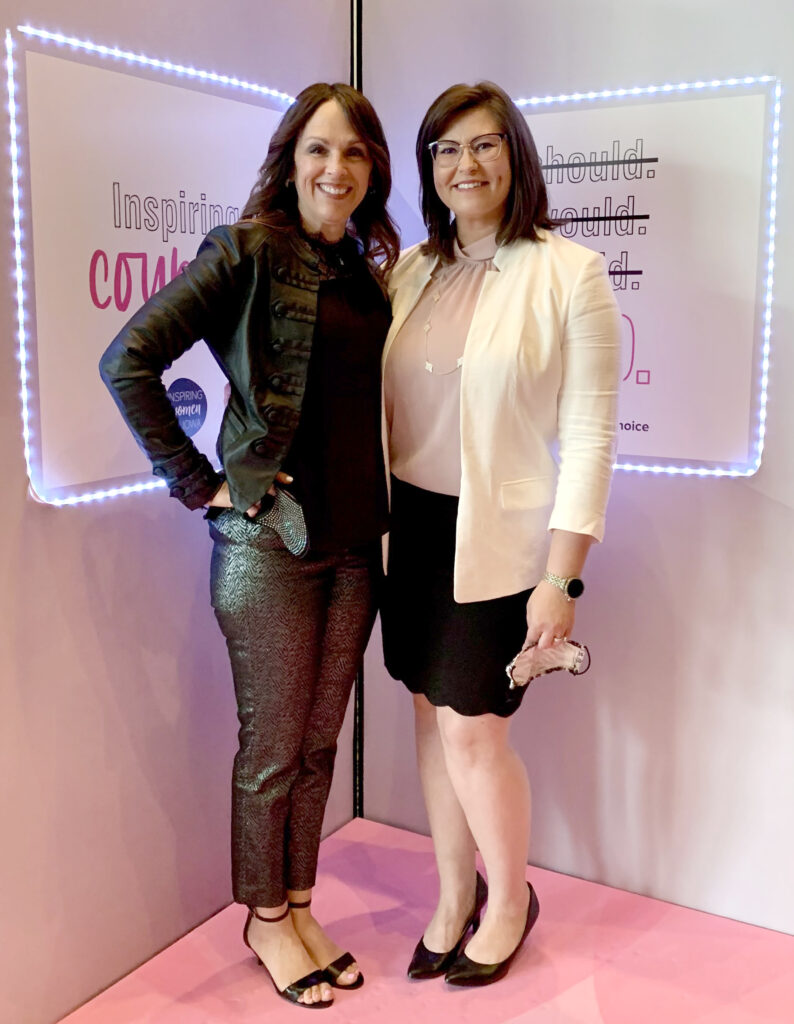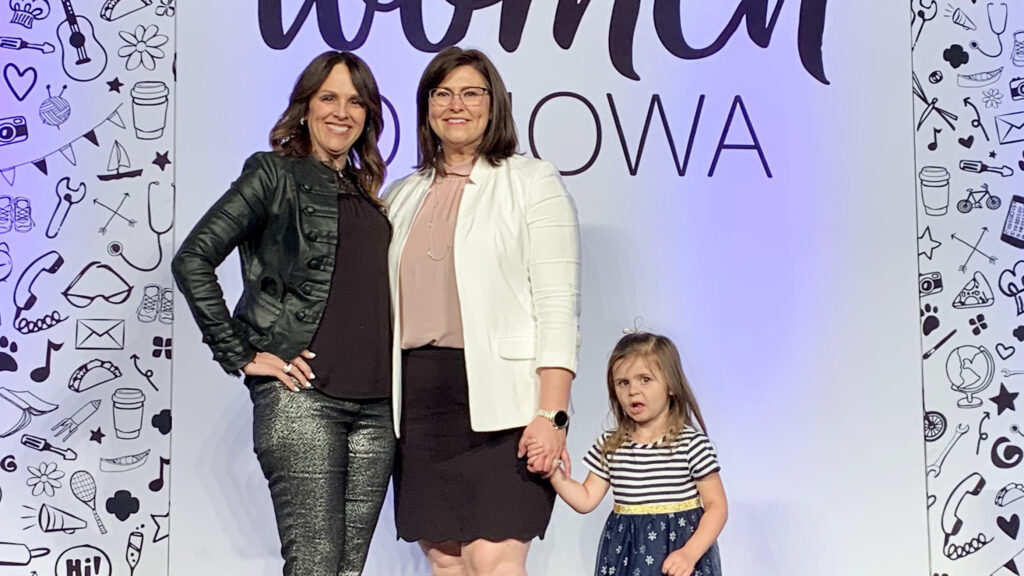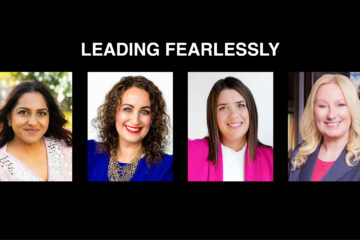By Krista Tedrow

On a muggy evening in 2015, I sat at the Ottumwa Applebee’s across from one of the most intriguing women I had met in my short career.
“What brought you to Ottumwa?” I asked.
She broke a tortilla chip in half and chewed thoughtfully for a moment before answering. “A couple of years ago I felt called to go into higher education. So I closed my law practice and made the leap. … My ultimate goal is to be a college president at a Christian university.”
I was 25 and in awe. I had never heard someone speak with such clarity and conviction. Since then, Rachelle Keck has been inaugurated as the president of not one, but two Christian universities – Briar Cliff and Grand View – and has also commenced and completed her Ph.D. I have come to know her as a mentor and friend.
I don’t believe I would be where I am today as a female founder, leader and mother without the support of many mentors along the way. The deck has been stacked against women in the workplace for generations. Change is coming, slowly, but it can accelerate much more quickly when women who break through those barriers reach back and become mentors to other women.
Life’s proverbial deck was stacked against me as my biological parents struggled with addiction, leading to multiple prison sentences and subsequent incarcerations.
I entered foster care when I was 7 and have been affected by all 10 adverse childhood experiences. When I shared a bit about my background, Rachelle and I found we are both first-generation college students with challenging socioeconomic backgrounds.
I had been saying I didn’t want children because I thought it would interfere with my career. However, that night I learned Dr. Keck was a mother of two and she had navigated professional life and parenting. She had started her own business and had a passion for advocating for children in the foster system and women who had experienced violence.
I began to think perhaps these were possibilities for me, too. She encouraged me to explore pursuing a bachelor’s degree – and I did.
Since 2015, I began to fear less and be more. Rachelle and other mentors have supported me as I have graduated with a bachelor’s and master’s degree in organizational leadership, founded companies and served on local and state boards.
The positive impact that mentorship has had on my life is evident.
Women’s mentorship is powerful and necessary
Organizations and the people within them thrive when women are in leadership roles. From thriving financials to higher employee satisfaction and improved culture, everyone benefits when women are in leadership roles. The same can be said of mentorship. Employees who are mentored are promoted five times more than those not connected to a mentor. While there are myriad reasons women’s mentorship is beneficial, I’ve highlighted three.
- Women are viewed as leaders, yet are not equally represented in senior leadership. The latest Women in the Workplace study from McKinsey & Co. shows that men in senior leadership outnumber women two to one — but employees are equally likely to say that women and men leaders have supported their career development. Women are viewed as leaders regardless of formal title or position and taking on mentorship roles. However, systemic inequities, biases and intersecting identities contribute to lack of representation in senior leadership roles.
- Women aren’t advancing and being promoted at the same rate as men. Women are promoted slower than men across all industries. The trend starts early in the career trajectory life cycle – with fewer women receiving stretch assignments or being promoted into manager roles. This means fewer women with access to interview for and accept executive leadership roles.
- Women face competing expectations and extreme perceptions. When negotiating, communicating with authority and expertise, likability is lower for women than for their male counterparts. Oftentimes women leaders are seen as too soft or too nice, too tough or too bossy … never just right – a Goldilocks effect of sorts. Acting assertively contributes to women experiencing negative outcomes like hindered hireability and promotional opportunities.
What makes women’s mentorship unique and impactful for both mentors and mentees?
In general, women must balance personal and professional responsibilities to a greater extent than men and consequently deal with higher levels of isolation, imposter syndrome and unconscious biases. Woman-to-woman mentoring relationships address the challenges women face in their personal and professional roles through meaningful and intentional interaction. Mentors and mentees benefit from mentorship; the best relationships become bilateral where each learns from the other.
How mentors benefit their mentees:
- Providing mentees with more visibility and exposure, increasing access to build social capital for women, particularly in male-dominated settings.
- Serving as confidants, sounding boards, personal advisers, and a safe space to reflect on personal core values while improving critical thinking and giving emotional support.
- Transferring knowledge, teaching skills and sharing their experiences to provide different perspectives and viewpoints relevant to a mentee’s situation.
How mentees benefit their mentors:
- Giving insight into a world that mentors aren’t normally privy to, resulting in enhanced and holistic systems thinking.
- Increasing ability to focus on one person while listening intently and nonjudgmentally enhances effective communication and other relationships.
- Opportunity to contribute to the development of the next generation of leaders and leaving a legacy.

Who are the women in your career who have made an impact on you?
Who are potential mentees you see in your sphere of influence or field? Reach out and start building that relationship. I believe when we take the moment to connect with the women around us, the possibilities are limitless. When we authentically engage there is a likelihood that we help each other see the possibilities and we are empowered to stand up and lead together.
I reached out to Dr. Keck to ask her what makes our mentor/mentee relationship unique. She said, “In many mentor/mentee relationships, there can be an imbalance of power of sorts, in that typically the older, more established mentor guides and advises the younger mentee. Not so in our relationship. We are remarkably similar in terms of our values and our focus on both personal and professional purposes. We have both worked authentically and diligently to gird the foundation of our relationship with mutual respect, faith and genuine care for each other. Despite our differences in age and career pathways, we have established deep trust in one another, setting aside egos and defense walls humans often build, enabling us to speak sometimes difficult truths to one another with grace and trust.”
I didn’t realize that night as we shared from the two-for-$20 menu the impact she would have on my life and career. Dr. Keck has made and continues to make intentional efforts to be present through countless phone calls, prayers, text messages, email exchanges, dinners, coffees, introductions and a precious investment of time that has changed my life. It didn’t matter if she was in the middle of interviewing for a presidential search, working on her doctorate, planning her wedding or traveling to speak at a national conference. She always finds time for me, and continues to inspire me as she lives and leads with clarity, conviction and compassion. Sometimes I wonder if our mentors realize just how much they have impacted us. I can only hope to have a positive impact on the women I mentor.
Krista Tedrow is the executive director of the South Central Iowa Workforce Area Local Workforce Development Board and the president of No Opportunity Wasted LLC. She graduated from Buena Vista University with bachelor’s and master’s degrees in organizational leadership.


